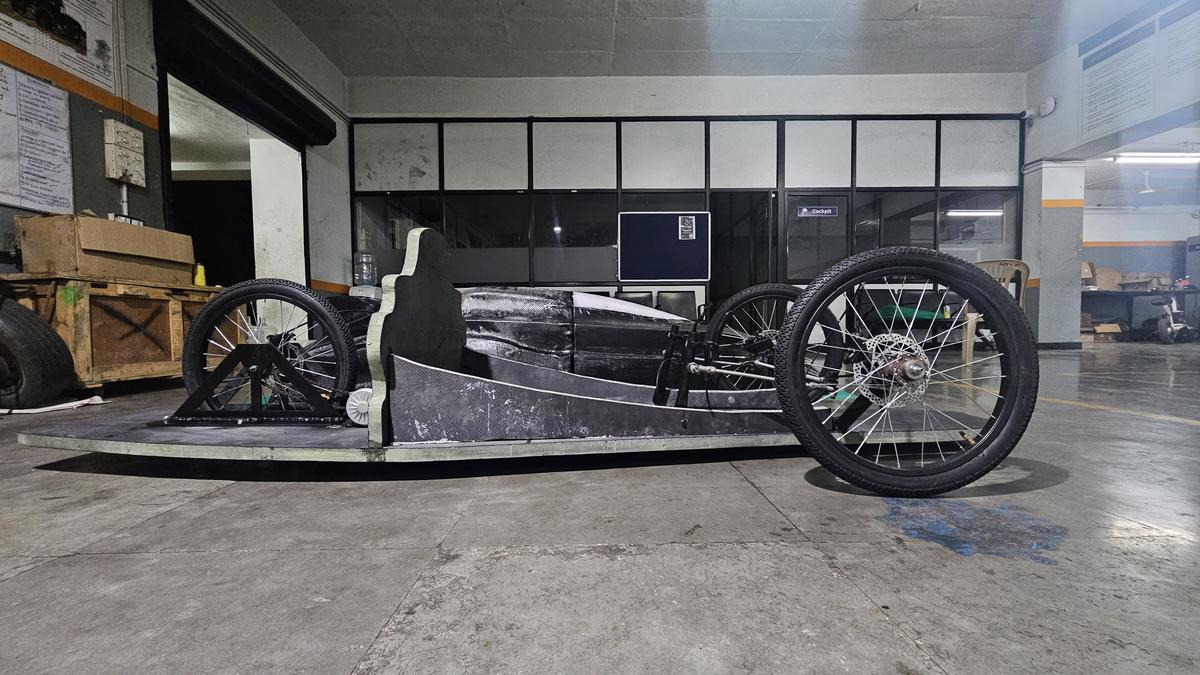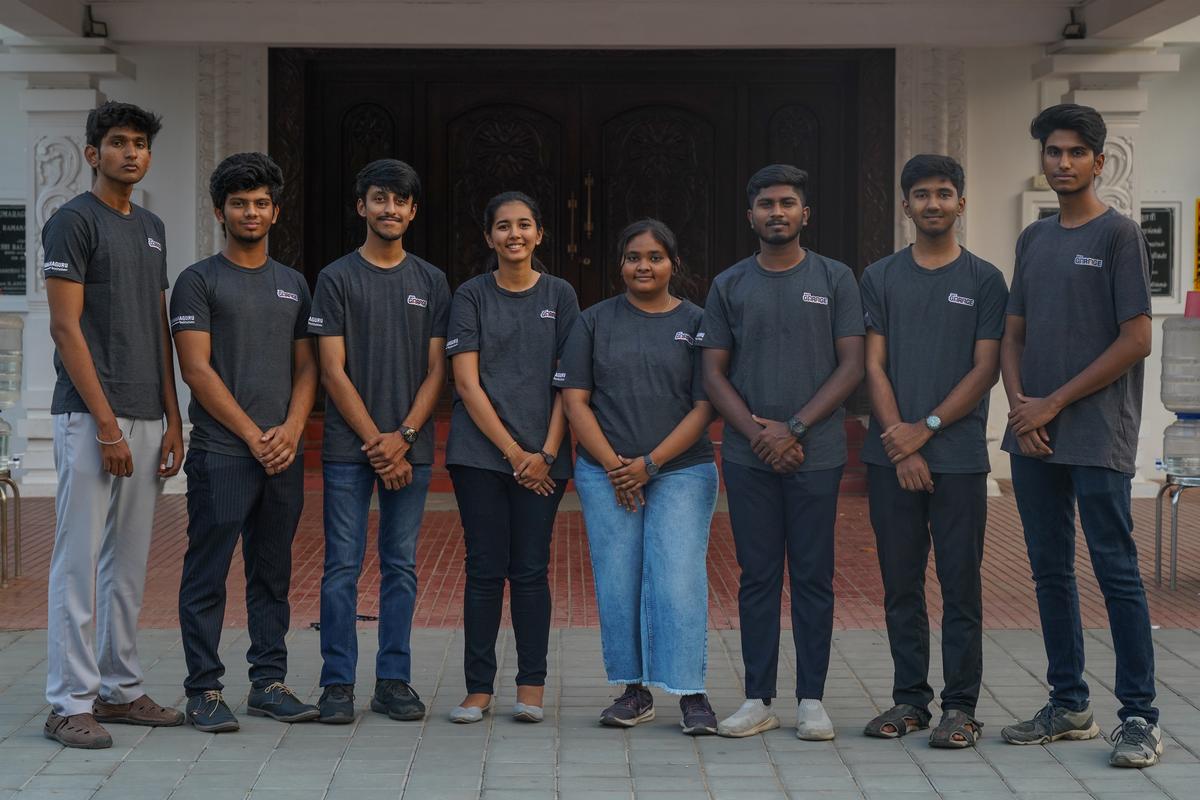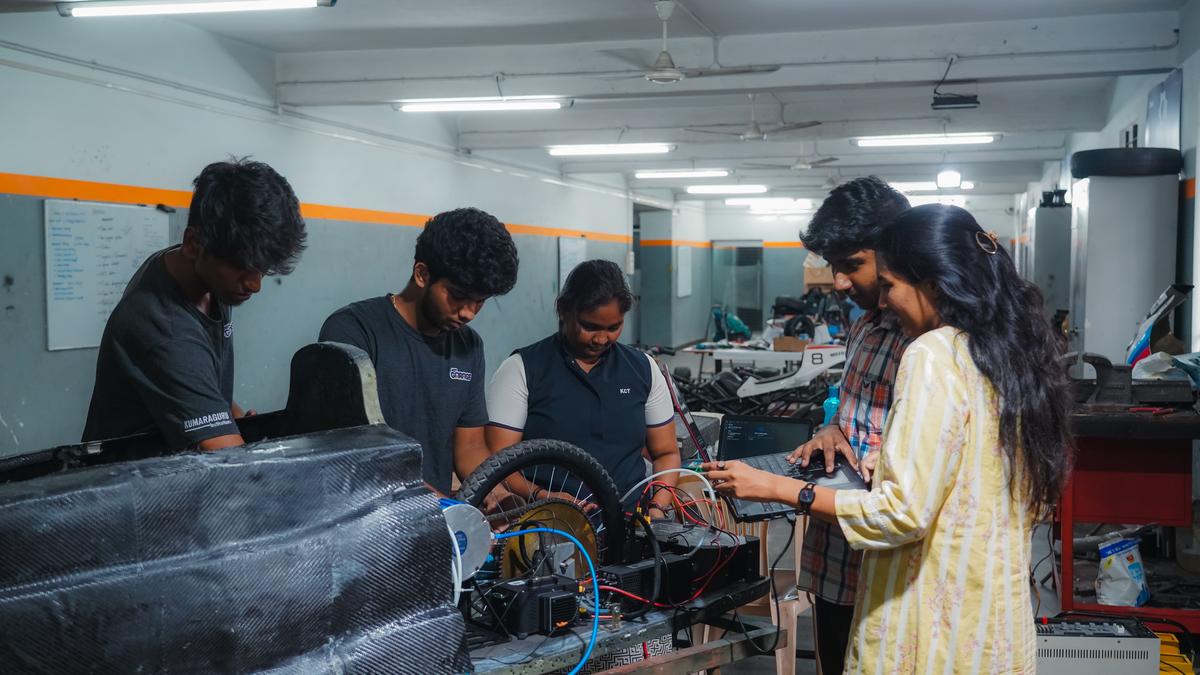On a cloudy Wednesday morning, we entered the tree-lined, peaceful campus of Kumaraguru Institutions in Coimbatore. The serenity of the grounds gave way to a different kind of energy as soon as we stepped into the KCT Garage. Here, the music of machinery replaced the chirping of birds. Tyres, wheels, and dismembered vehicles filled the space, some in various stages of assembly, others seemingly on the verge of being taken apart.
The KCT Garage isn’t your typical workshop. It’s a student-driven product development research centre dedicated to automotive innovation. It’s a place where students design and fabricate a wide range of vehicles, from all-terrain vehicles and formula cars to quad bikes, dirt bikes, go-karts, and even solar karts.
On this particular Wednesday, however, all eyes in the Garage were fixated on one creation: Team ReNew’s project. It is a sleek, dolphin-shaped, black prototype vehicle powered by hydrogen fuel cells.

Team ReNew’s hydrogen fuel cells-powered vehicle
| Photo Credit:
Special Arrangement
The vehicle is being built for the Shell Eco-Marathon Asia Pacific competition. Originating as a friendly endurance event 38 years ago, it has transformed into a global event for sustainable automotive technology. Every year, it attracts over 1,000 students from over 50 countries, all united by a common goal: designing, building, and driving the most energy-efficient vehicles imaginable. This year’s Shell Eco-Marathon Asia Pacific will be held at the Pertamina Mandalika International Circuit in Lombok, Indonesia, from July 2 to 6.
The challenge is daunting. Team ReNew’s (comprising 10 undergraduate students) creation will be tested on the track, tasked with completing three laps of a demanding 4.3-kilometre circuit—all within a strict 30-minute timeframe. The winner will be crowned based on a single crucial factor: the least amount of energy consumed. Team ReNew’s dolphin-shaped automobile isn’t just about speed; it’s about pushing the boundaries of efficiency and paving the way for a cleaner future.
Asvitha Rajesh, the team manager, explains their design philosophy: “Our design is inspired by biomimicry, specifically dolphins. Their exceptional aerodynamics made them the perfect model. We explored various options, including cheetahs and toucan beaks, but dolphins offered the optimal solution for minimal drag. Using Computational Fluid Dynamics (CFD) software, we confirmed our design’s low drag coefficient, similar to a dolphin’s sleek form.”
Team captain Prathish Subu chimes in: “Our vehicle prioritises both performance and safety. We utilise a lightweight, aerodynamic carbon fibre monocoque structure with strategically placed PVC foam for impact absorption. This construction achieves an incredibly low drag coefficient.” This bio-inspired design is Team ReNew’s commitment to innovation and efficiency, making their creation a strong contender at the Shell Eco-Marathon Asia Pacific.
Apart from Asvitha and Prathish, the team comprises of Uthith Naraayanan G, Siyam Sundar CN, Pratheesh Hariharan C, Harini S, Vikkram LK, and Dhanush Raj VM.

Team ReNew
| Photo Credit:
Special Arrangement
The team’s choice of hydrogen fuel cells isn’t just about winning a competition; it’s a statement about the future of transportation. Hydrogen boasts a triple threat advantage – it carries three times the energy per unit weight compared to gasoline, emits zero harmful tailpipe emissions (only water vapour), and aligns perfectly with global efforts to combat climate change.
According to the team, a gasoline-powered car travelling 200 kilometres would release 50,000 grams of CO2, a significant contributor to greenhouse gasses. Meanwhile, a hydrogen fuel cell vehicle would produce zero emissions for the same distance.
Muhsinul Islam, the associate lead of KCT Garage, emphasises its contribution to a larger goal: “Our project tackles zero-carbon emissions, a key Sustainable Development Goal (SDG). Transportation is a major contributor to carbon emissions, and hydrogen fuel cells offer a promising solution. While currently expensive for two-wheelers, our long-term goal (5-6 years) is to develop a cost-effective hydrogen fuel cell stack specifically designed for two-wheelers. This technology will cater to a large middle-class segment and significantly reduce emissions.”
However, the road to innovation wasn’t without bumps. Balancing academics with the demands of building a complex vehicle required immense dedication. “We weren’t deterred by long hours. We would turn up after college, even on holidays, to meet deadlines,” says Asvitha.
Over eight months, Team ReNew transformed from enthusiastic students into a well-oiled machine. A few more fine-tuning and final testing rounds remain before the team sets off for Lombok, Indonesia. The challenge awaits, but Team ReNew is poised to make a mark, leaving not just tyre tracks but a hope for a sustainable future.
#Coimbatore #Kumaraguru #student #team #builds #hydrogenpowered #vehicle






